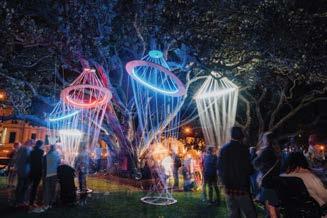
3 minute read
Bachelor of Landscape Architecture
LEVEL 7 BACHELOR OF LANDSCAPE ARCHITECTURE
Total credits 480 (4.0 EFTS) Campus Mt Albert Start dates February (full-time or parttime) or July (part-time only) Duration Full-time for four year or part-time options available Annual tuition fees $7,400 (NZD) (Approximate domestic fee only)
Career opportunities • Landscape architect • Environmental design consultant • Urban designer • Heritage landscape consultant • Regional planner • Environment commissioner
Highlights • A focus on design studio and one-on-one practice-based learning that supports your individual skills and growth as a designer. • Real-world learning that involves regular engagement, and both collaborative and competitive work with practicing professionals, including awardwinning landscape architects, urban designers, architects and other related professionals. • Be part of international study tours and a vibrant exchange programme - important to understanding international practice. • Access to internships and merit-based awards • A fully accredited degree registered by the New Zealand Institute of Landscape Architects (NZILA) on behalf of the International Federation of Landscape
Architects (IFLA). • When you graduate, you can go onto further study in the Master of Landscape Architecture (see pg.19).
This is an internationally accredited, professional programme that prepares you for creative practice as a landscape architect in urban and environmental design anywhere in the world - re-imagining our urban environments and re-thinking our cities.
Programme overview Landscape architects are employed for their vision and skill in transforming the spaces of everyday life, and in solving the real and serious environmental issues facing today's society.
Landscape architecture brings together science, technology, art and design, in order to engage in a broad range of environmental design projects. These can involve urban design, transportation infrastructure, waterfronts and resorts, coastal, estuarine and in-land ecologies, or creating engaging and vibrant community and public spaces.
In this degree you’ll create designs for a variety of exciting landscape projects and further your understanding of CAD modelling, environmental planning and contemporary urbanism.
Admission requirements For this programme, you’ll need:
Academic
1. 42 credits at NCEA Level 3 or higher including: • 14 credits in two different approved subjects; and • 14 credits from up to two subjects (approved or non-approved)
2. 8 credits at NCEA Level 2 or higher in English or Te Reo Māori (4 in reading, 4 in writing) 3. 14 credits in NCEA Level 1 or higher in
Mathematics or Pāngarau
English
If English is not your first language, you’ll need one of the following:
• Achieved NCEA Level 3 and
New Zealand University Entrance • Provide evidence you satisfy our criteria for existing English proficiency such as
IELTS • Achieved at least one English proficiency outcome in the last two years If you don’t meet the English criteria above, we have a range of English Language programmes available (see unitec.ac.nz/ english).
There are additional English requirements for international students – you can find more information on our website.
Other options: If you don’t meet these requirements, you’ll need one of the following:
A relevant qualification at Level 3 or above on the NZQF or equivalent Evidence you’re eligible for special or discretionary admission
For more information download the programme regulations: unitec.ac.nz/landscape
International Students, please visit unitec.ac.nz/international
Apply Now
GLOW@ARTWEEK
Tyres, plastic piping, bamboo and coconut shells were just some of the sustainable and recycled materials used by Architecture students for the annual GLOW@Artweek festival on Devonport’s Windsor Reserve.
Nine teams of second-year Unitec Architecture students designed and prefabricated a diverse range of interactive light installations for GLOW@Artweek, working to a zero-waste, zero-budget brief. The students prototyped their designs workshops, the studio and Building 1 Fale Courtyard before dismantling and transporting to the Devonport location. Unitec Architecture lecturer Ainsley O'Connell says, “The designs responded seriously to the zero-waste, zero budget requirements, with each team presenting a full disposal strategy as a core part of their designs.”





